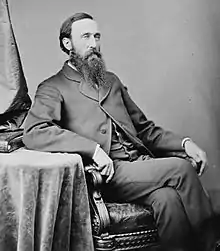Alfred Eliab Buck
Alfred Eliab Buck (February 7, 1832 – December 4, 1902) was a U.S. Representative from Alabama.
Alfred Eliab Buck | |
|---|---|
 | |
| Member of the U.S. House of Representatives from Alabama's 1st district | |
| In office March 4, 1869 – March 3, 1871 | |
| Preceded by | Francis W. Kellogg |
| Succeeded by | Benjamin S. Turner |
| Personal details | |
| Born | Alfred Elias Buck February 7, 1832 Foxcroft, Maine |
| Died | December 4, 1902 (aged 70) Tokyo, Japan |
| Political party | Republican |
| Nickname(s) | "Boss Buck" |
Biography
Born in Foxcroft, Maine, Buck graduated from Waterville College (now Colby College) in 1859. During the Civil War he entered the Union Army as captain of Company C, Thirteenth Regiment, Maine Volunteer Infantry. He was appointed lieutenant colonel of the Ninety-first United States Colored Troops in August 1863, was transferred to the Fifty-first United States Colored Troops in October 1864, and was made brevetted colonel of Volunteers for gallant conduct. He was mustered out of the service at Baton Rouge, Louisiana, in June 1866. He then served as delegate to the constitutional convention of Alabama in 1867, and as clerk of the circuit court of Mobile County in 1867 and 1868.
Buck was elected as a Republican to the Forty-first Congress (March 4, 1869 – March 3, 1871). He was appointed president of the city council of Mobile in 1873. He served as clerk of the United States circuit and district courts in Atlanta, Georgia from 1874 to 1889. He was United States marshal for the northern district of Georgia 1889-1893.
In 1896, Buck was the leader of the Georgia Republican Party. Buck was the president of the Republican State Convention in late April and presided over the electing of delegates to the 1896 Republican National Convention. There was dispute over the delegates, which Buck attempted to preempt by passing a "harmony" slate of delegates outside of standard procedure. However, the slate did not include Emanuel K. Love's friend, Richard R. Wright, who many believed would be a delegate. The convention erupted in protest and a representative of Buck's attempted to adjourn the meeting and the Buck faction left the hall. The Love and Wright faction remained and Love took the chair, electing a new slate of delegates, now including Love (and Buck but still not Wright).[1] Eventually Buck was a delegate and Wright attended as an alternate.[2]
He was appointed Minister to Japan by President William McKinley in April 1897 and served until his death in Tokyo, Japan, on December 4, 1902. He was interred in Arlington National Cemetery.
See also
References
- United States Congress. "Alfred Eliab Buck (id: B001011)". Biographical Directory of the United States Congress. Retrieved on 2008-02-14
- Shadgett, Olive Hall. The Republican Party in Georgia: From Reconstruction Through 1900. University of Georgia Press, 2010. p133-134
- Republican national convention, St. Louis, June 16th to 18th, 1896. With a history of the Republican party and a survey of national politics since the party's foundation, etc., etc, Republican National Convention (11th : 1896 : Saint Louis, Mo.), page 179, accessed October 17, 2016 at https://archive.org/stream/republicannation00repurich#page/178/mode/2up
External links
![]() This article incorporates public domain material from the Biographical Directory of the United States Congress website http://bioguide.congress.gov.
This article incorporates public domain material from the Biographical Directory of the United States Congress website http://bioguide.congress.gov.
| U.S. House of Representatives | ||
|---|---|---|
| Preceded by Francis W. Kellogg |
Member of the U.S. House of Representatives from Alabama's 1st congressional district 1869 – 1871 |
Succeeded by Benjamin S. Turner |